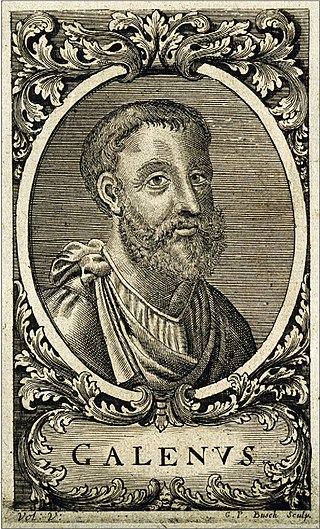
Aelius Galenus or Claudius Galenus, often anglicized as Galen or Galen of Pergamon, was a Roman and Greek physician, surgeon, and philosopher. Considered to be one of the most accomplished of all medical researchers of antiquity, Galen influenced the development of various scientific disciplines, including anatomy, physiology, pathology, pharmacology, and neurology, as well as philosophy and logic.

The history of medicine is both a study of medicine throughout history as well as a multidisciplinary field of study that seeks to explore and understand medical practices, both past and present, throughout human societies.
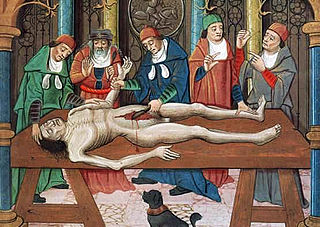
The history of anatomy extends from the earliest examinations of sacrificial victims to the sophisticated analyses of the body performed by modern anatomists and scientists. Written descriptions of human organs and parts can be traced back thousands of years to ancient Egyptian papyri, where attention to the body was necessitated by their highly elaborate burial practices.

Pedanius Dioscorides, "the father of pharmacognosy", was a Greek physician, pharmacologist, botanist, and author of De materia medica, a 5-volume Greek encyclopedia about herbal medicine and related medicinal substances, that was widely read for more than 1,500 years. For almost two millennia Dioscorides was regarded as the most prominent writer on plants and plant drugs.

In the Middle Ages, the medicine of Western Europe was composed of a mixture of existing ideas from antiquity. In the Early Middle Ages, following the fall of the Western Roman Empire, standard medical knowledge was based chiefly upon surviving Greek and Roman texts, preserved in monasteries and elsewhere. Medieval medicine is widely misunderstood, thought of as a uniform attitude composed of placing hopes in the church and God to heal all sicknesses, while sickness itself exists as a product of destiny, sin, and astral influences as physical causes. On the other hand, medieval medicine, especially in the second half of the medieval period, became a formal body of theoretical knowledge and was institutionalized in the universities. Medieval medicine attributed illnesses, and disease, not to sinful behavior, but to natural causes, and sin was connected to illness only in a more general sense of the view that disease manifested in humanity as a result of its fallen state from God. Medieval medicine also recognized that illnesses spread from person to person, that certain lifestyles may cause ill health, and some people have a greater predisposition towards bad health than others.
Roy Sydney Porter was a British historian known for his work on the history of medicine. He retired in 2001 from the director of the Wellcome Institute for the History of Medicine at University College London (UCL).
Lawrence Irvin Conrad is a British historian and scholar of Oriental studies, specializing in Near Eastern studies and the history of medicine. He currently serves as historian for the Wellcome Institute for the History of Medicine in London.

Helen King is a British classical scholar and advocate for the medical humanities. She is Professor Emerita of Classical Studies at the Open University. She was previously Professor of the History of Classical Medicine and Head of the Department of Classics at the University of Reading.
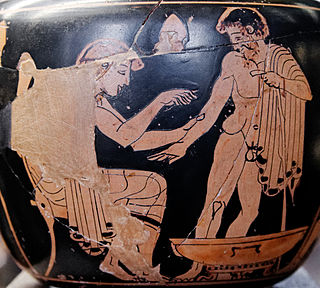
Ancient Greek medicine was a compilation of theories and practices that were constantly expanding through new ideologies and trials. The Greek term for medicine was iatrikē. Many components were considered in ancient Greek medicine, intertwining the spiritual with the physical. Specifically, the ancient Greeks believed health was affected by the humors, geographic location, social class, diet, trauma, beliefs, and mindset. Early on the ancient Greeks believed that illnesses were "divine punishments" and that healing was a "gift from the Gods". As trials continued wherein theories were tested against symptoms and results, the pure spiritual beliefs regarding "punishments" and "gifts" were replaced with a foundation based in the physical, i.e., cause and effect.
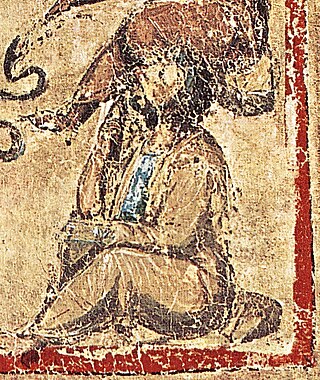
Rufus of Ephesus was a Greek physician and author who wrote treatises on dietetics, pathology, anatomy, gynaecology, and patient care. He was an admirer of Hippocrates, although he at times criticized or departed from that author's teachings. While several of his writings survive in full and have been critically edited, most are fragmentary and lack critical editions. His writings explore subjects often neglected by other authors, such as the treatment of slaves and the elderly. He was particularly influential in the East, and some of his works survive only in Arabic. His teachings emphasize the importance of anatomy and seek pragmatic approaches to diagnosis and treatment.

Medicine in ancient Rome was highly influenced by ancient Greek medicine, but also developed new practices through knowledge of the Hippocratic Corpus combined with use of the treatment of diet, regimen, along with surgical procedures. This was most notably seen through the works of two of the prominent Greek physicians, Dioscorides and Galen, who practiced medicine and recorded their discoveries. This is contrary to two other physicians like Soranus of Ephesus and Asclepiades of Bithynia, who practiced medicine both in outside territories and in ancient Roman territory, subsequently. Dioscorides was a Roman army physician, Soranus was a representative for the Methodic school of medicine, Galen performed public demonstrations, and Asclepiades was a leading Roman physician. These four physicians all had knowledge of medicine, ailments, and treatments that were healing, long lasting and influential to human history.
Harold John Cook is John F. Nickoll Professor of History at Brown University and was director of the Wellcome Trust Centre for the History of Medicine at University College, London (UCL) from 2000 to 2009, and was the Queen Wilhelmina Visiting Professor of History at Columbia University in New York during the 2007–2008 academic year.
The Wellcome Institute for the History of Medicine (1968–1999) was a London centre for the study and teaching of medical history. It consisted of the Wellcome Library and an Academic Unit. The former was and is a world-class library collection owned and managed by the Wellcome Trust and staffed by librarians including academic librarians who held honorary lectureships at University College London. The Academic Unit was a group of university staff appointed at University College London that conducted a programme of university teaching, thesis supervision, seminars, conferences and publications.
Medical History is a peer-reviewed academic journal covering the history of medicine. It was established in 1957. After many decades of funding by the Wellcome Trust, ownership of the journal passed to Cambridge University Press in about 2011.
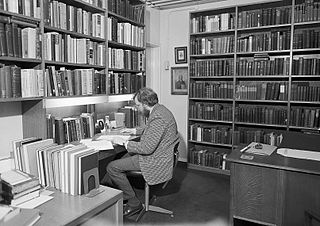
William Frederick Bynum is a British emeritus professor in history of medicine. For most of his career, he has worked at the Wellcome Trust Centre for the History of Medicine, University College London (UCL).
Aristocrates was a grammarian of Ancient Greece who despite being described as a "grammarian" is nevertheless mostly remembered as the source of a remedy for toothache passed down by either the elder or younger Andromachus, and later quoted by medical annalist Galen. Because he was not described as himself being a doctor or scientist, but is quoted by later medical scientists, he is sometimes referred to as an example or practitioner of Ancient Greek folk or traditional medicine.
Sophia Xenophontos is a Greek-Cypriot classicist and associate professor of Greek at Aristotle University of Thessaloniki. She is also affiliate scholar with the University of Glasgow, where she was previously lecturer in Classics and principal investigator and director of the Byzantine Aristotle project funded by the AHRC. Xenophontos is an external collaborator for the Commentaria in Aristotelem Graeca et Byzantina project and the founder and editor-in-chief of the book series ‘Theorising the Greek and Roman Classics’.
Rebecca Flemming is a Classicist. She holds the inaugural A.G. Leventis Chair as Professor of Ancient Greek Scientific and Technological Thought at the University of Exeter.

Laurence Totelin (FRHistS) is a historian of Greek and Roman Science, Technology, and Medicine. She is Professor of Ancient History at Cardiff University.
Roger Kenneth French was an English medical historian, specializing in medieval and Renaissance medical history. He was one of the world's leading experts on the anatomical work of William Harvey.











